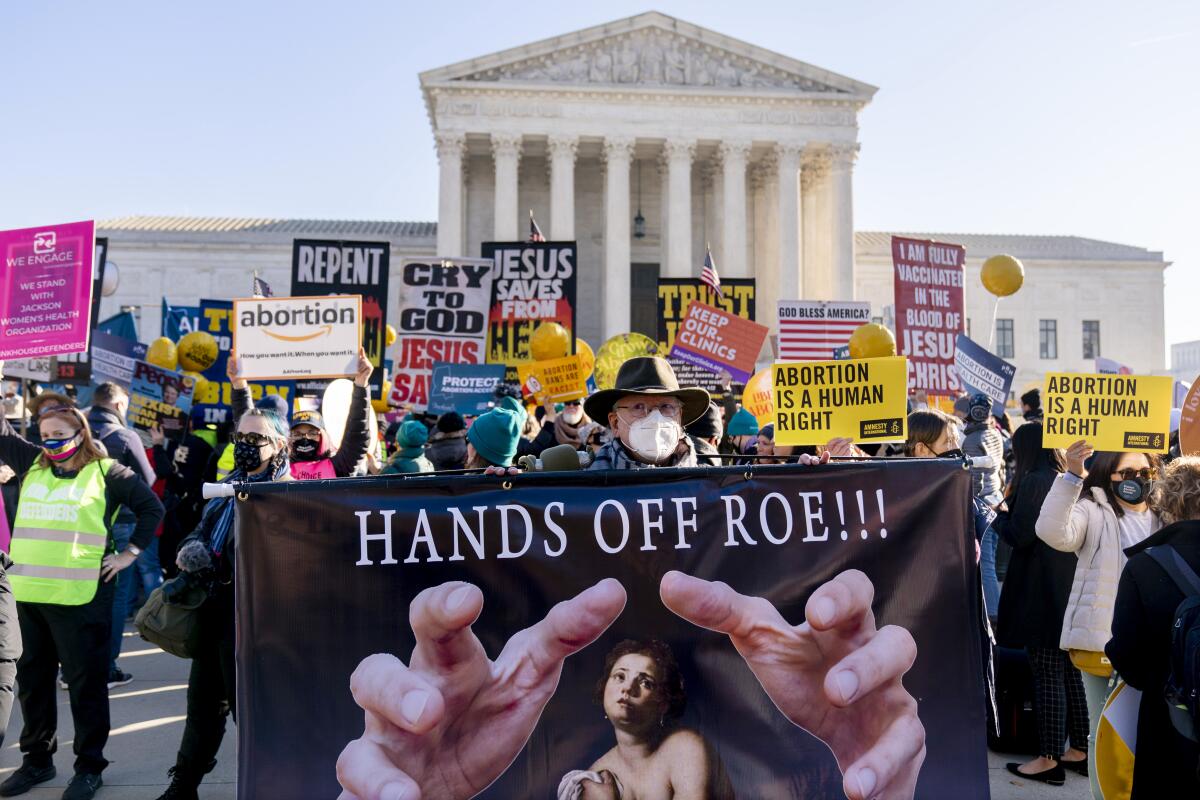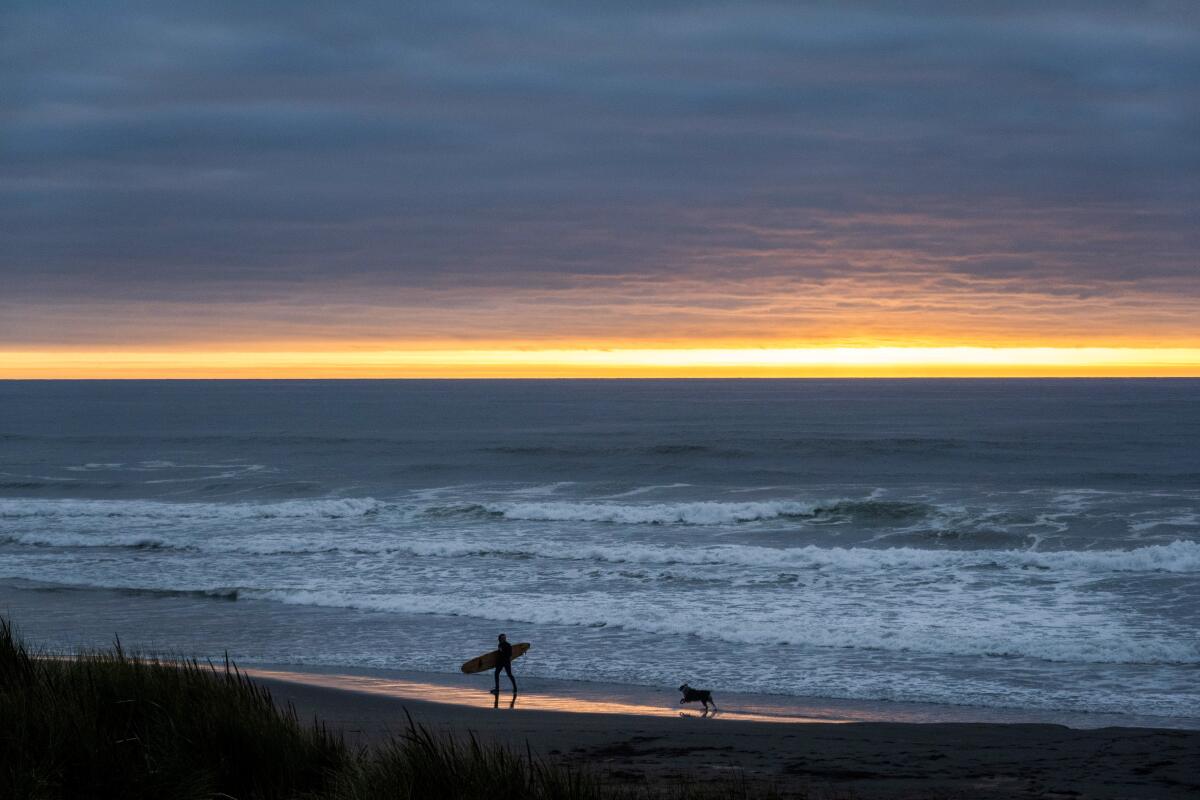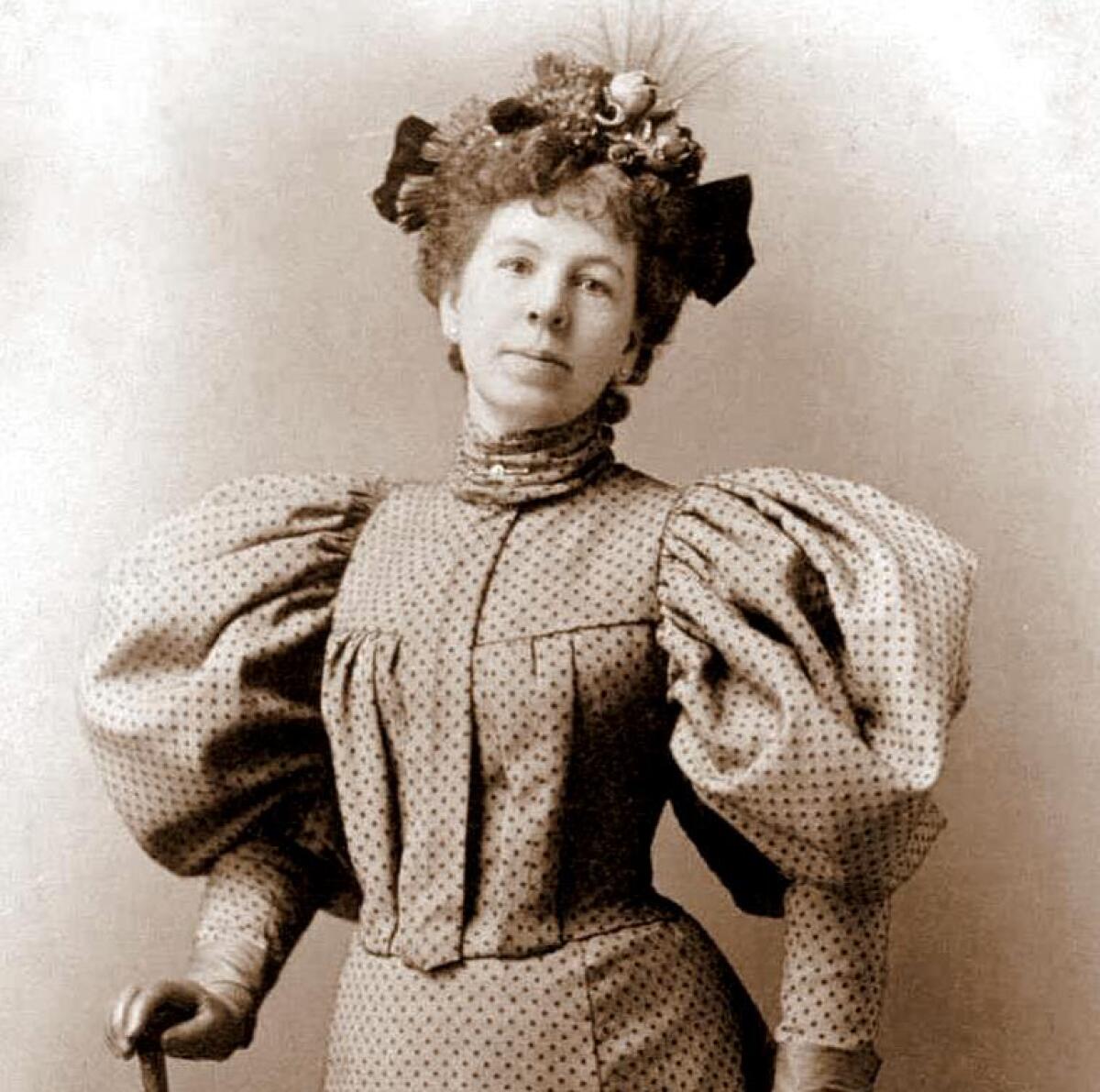Today’s Headlines: A fragile election in an unsettled political moment

- Share via
By Amy Hubbard
Hello, it’s Tuesday, Sept. 6, and here are the stories you shouldn’t miss today:
TOP STORIES
A hyperpolarized, deeply fragile 2022 election
At the start of 2022, the political consensus was Democrats were toast. Yet the chatter among pundits and party strategists now centers on whether the Democrats might avoid a rout this fall — or even, improbably, keep their hold of Congress.
Since the last national vote, in 2020, the country has endured, among other things, an attack on the U.S. Capitol, the reversal of Roe vs. Wade, an FBI search of a former president’s home, the continuing horrors of mass shootings, and COVID-19 still weighs on the nation’s physical and mental states. Faith in the presidency and Supreme Court are low, and Americans are more polarized along party lines.
Call it the “I don’t know” election in the fight for Congress.
Start your day right
Sign up for Essential California for the L.A. Times biggest news, features and recommendations in your inbox six days a week.
You may occasionally receive promotional content from the Los Angeles Times.
More politics
- Gov. Gavin Newsom signed a nation-leading measure giving more than a half million fast-food workers more power and protections, despite restaurant owners’ objections that it would drive up consumers’ costs.
- Two months after passing historic plastics legislation, state lawmakers sent half a dozen more bills to the governor’s desk to reduce waste.
- President Biden blasted the “extreme” GOP in Labor Day swing-state trips.
Sign up for our California Politics newsletter to get the best of The Times’ state politics reporting and the latest action in Sacramento.
Officials plead with Californians to reduce energy use or face blackouts
With California in the worst phase of a historic heat wave, authorities have amplified their urgent call for residents to reduce energy use voluntarily or face the prospect of rolling blackouts. The Flex Alert was extended for an extra hour to cover the period from 4 to 10 tonight.
“We are in an extraordinary event,” said California Energy Commissioner Siva Gunda. He said today’s anticipated demand from the grid — 51,000 megawatts — “would be the highest in September that we’ve ever seen.”
For gang outreach workers, wrestling with psychological scars is now part of the battle
A recent study found that many violence prevention workers grappled with post-traumatic stress disorder “as a result of witnessing shootings and their aftermaths, as well as engaging with victims of violence and family members related to victims.”
Gang interventionists have long been on the front lines of Los Angeles’ fight against gang violence. Amid renewed interest in their trade since the murder of George Floyd, they are recognizing the mental health impact of their jobs — and are seeking help.
Check out Group Therapy, our new mental wellness newsletter, where we answer questions sent in by readers about what’s been weighing on their hearts and minds.
“I’m not an optimist or a pessimist. I’m a scientist.”
Economist and professor Vaclav Smil says his mission is to “lay out facts” about how deeply dependent humanity is on fossil fuels and how difficult it will be to give them up. Fossil fuels supply 83% of the world’s energy compared with 86% 20 years ago. He asks, then, what the chances are the world will go from 83% to zero during the next two decades.
Should we become hopeless? No, he says, we should become serious.
“Old Romans knew it well: Where difficult matters are at stake, the change is best affected by slow but relentless progress. ... We should persevere in doing many small things, and eventually they add up. But so far, we are not even seriously trying — see the ascent of SUVs, the pervasiveness of excessive flying, and food supermarkets that now average 40,000 items. That all requires plenty of carbon.”
Our daily news podcast
If you’re a fan of this newsletter, you’ll love our daily podcast “The Times,” hosted every weekday by columnist Gustavo Arellano, along with reporters from across our newsroom. Go beyond the headlines. Download and listen on our App, subscribe on Apple Podcasts and follow on Spotify.
PHOTO OF THE DAY

CALIFORNIA
Two people were killed in a rapidly expanding fire near Hemet. The Fairview fire ignited around 3 p.m. Monday and quickly spread to more than 2,000 acres, prompting evacuations, the Riverside County Fire Department said. Meanwhile, the Radford fire erupted just west of Sugarloaf near Big Bear Lake and covered about 200 acres by Monday evening. Meanwhile, fires continued to threaten parts of Northern California; a Siskiyou County blaze consumed a neighborhood in the town of Weed, killing two, and another threatened Rodeo in Contra Costa County.
“Cyborg oracle” Alice Wong’s debut memoir is out today. The disability rights activist has conducted symphonies of online protest and swayed Democratic standard-bearers toward disability justice. She’s written a memoir, edited two anthologies, hosted a podcast and run the Disability Visibility Project, a platform for disabled writers and artists. “My cyborg body is tethered to orbiting satellites of objects,” Wong writes in “Year of the Tiger.” “These bits of hardware, machines, and everyday objects may not live and breathe, but they are a part of me. They simultaneously ground and liberate me. They center me and allow me to make the most of my life.”
Support our journalism
Subscribe to the Los Angeles Times.
NATION-WORLD
Vietnam and Afghanistan: America’s two longest wars, with very different lasting impacts. Both wars ended badly, with U.S. efforts in tatters. But they were worlds apart in who fought, how and what came of it.
Ukraine said the Zaporizhzhia nuclear plant was offline. The plant was knocked off the electricity grid, its last transmission line disconnected because of a fire caused by Russian shelling, the facility’s operator and the U.N. atomic watchdog said. The incident fueled fears of a potential nuclear disaster at Zaporizhzhia, one of the 10 biggest nuclear plants in the world.
One suspect in the Saskatchewan mass stabbings was found dead. His injuries were not self-inflicted, police said. The man was one of two suspected of carrying out the series of stabbings in an Indigenous community and a nearby town in the Canadian province that killed 10 and injured 18.
A judge granted Trump’s bid for a special master in the Mar-a-Lago case. The request had come from the former president’s legal team to appoint a special master to review the documents seized by the FBI during a search of his Florida home last month. The Justice Department had argued that an outside legal expert was not necessary in part because officials had already completed their review. The judge asked a department lawyer during arguments this month, “What is the harm?”
Liz Truss, Britain’s foreign secretary, will succeed Boris Johnson as prime minister. Truss becomes the third woman to hold the post. She faces immediate pressure to deliver on her promises to tackle a cost-of-living crisis walloping Britain and an economy heading into a potentially lengthy recession.
HOLLYWOOD AND THE ARTS
Review: Olivia Wilde’s scandal-ridden “Don’t Worry Darling” isn’t good — or bad — enough. It’s a handsomely assembled, increasingly transparent thriller that stomps when it should creep and drags when it should accelerate, writes film critic Justin Chang. Mainly it reminds you of the many earlier, better pictures it consciously resembles.
Family revelations enriched A.M. Homes’ new novel about a MAGA-type cabal. Homes began writing “The Unfolding” around the time of President Obama’s defeat of Sen. John McCain. In the book, a character identified only as “the Big Guy” organizes a group of wealthy Republicans to form the “Forever Men,” a secret cabal pledged to use any means necessary to keep themselves and their species in power. The novel pairs slapstick political satire with tender observations about the relationship between parents and children. Homes talks about how meeting her biological father helped shape her novel.
BUSINESS
Got a yard or a garage? Know a second language? Check out these new ways to make money. Among them: Renting out your yard to dog owners without a place for their pets to run is one of the least work-intensive side hustles around.
OPINION
Commentary: More workers are trying to unionize. Support will be crucial to their success. This Labor Day, it’s especially important that Congress commit to addressing workers’ frustrations and exacting real consequences for labor injustice.
Op-Ed: There is an adage in the business world that “work expands to fill the available time.” In a digitally connected world, that is all the time. It’s a long way from the 40-hour workweek that was a central achievement of the U.S. labor movement. Nearly half of remote workers report they work longer than when they were at the physical job site.
Free online games
Get our free daily crossword puzzle, sudoku, word search and arcade games in our new game center at latimes.com/games.
SPORTS
What’s new in the NFL? There are plenty of coaching newbies and imminent player milestones. Ten teams will be pegging their hopes on new coaches. Is it better to hire a first-time head coach with fresh ideas, or a seasoned one with previous NFL experience? This year is split down the middle, with five newbies and five retreads. Among milestones: The Chargers’ Keenan Allen is a 100-catch season from joining Antonio Brown and Harrison as the only players with 100 receptions four seasons in a row. See our NFL season preview package.
Column: Even with a ring, Matthew Stafford hasn’t earned super respect. It took one season away from the Detroit Lions for Matthew Stafford to win a Super Bowl, writes Bill Plaschke, yet the quarterback still faces doubters. Is he a great quarterback, or is he on a great team?
Column: Can Justin Herbert’s promise outweigh the Chargers’ beleaguered past? They appear armed, writes Dylan Hernández. The team has lived this before: a great quarterback, but the team still doesn’t produce championships. Perhaps Herbert can break that trend.
Walker Buehler is looking ahead to his second Tommy John rehab with hope but also uncertainty. Data show Buehler is the 70th pitcher to undergo a second such surgery as a major leaguer. Although the majority of the previous 69 returned to the big leagues, many were never the same, often having brief and ultimately ineffective returns. “I have a lot of pride in the career I’ve had so far,” Buehler said, “and hopefully it’s not the end of it. I certainly don’t think it is.”
GREAT READS FROM THE WEEKEND
JPL is trying to keep the Voyager probes from disconnecting the world’s longest-distance phone call. Voyager 1 launched in 1977. In 1980, it passed Saturn and just kept going. It is now more than 14 billion miles from Earth. During a check-in call in May, the signal “came back in jumbled bits,” a scientist said. Scientists are trying to solve the problem and keep the conversation going with both Voyagers 1 and 2. Scientist Bill Nye called the spacecraft the “vanguard of human intellect and treasure.” Their dispatches include valuable scientific data about interstellar magnetic fields, cosmic rays and plasma waves. But the farther they go, the harder they are to hear, and the spacecraft are getting weaker too.
Europe was once green and water-rich. Now, it’s more and more like California. A withered Europe faces what scientists say could be its worst water shortage in the hundreds of years on record. Farms are going fallow, and vineyards are seared. Reservoirs and aquifers have been depleted. Rivers have dried up to reveal Roman-era artifacts and unexploded war munitions. Wildfires have raged across a dozen countries. Scores of small cities and towns are trucking in water because the taps have run dry. Altogether, 64% of the continent is facing drought or in imminent danger of it, according to a recent report.
ONLY IN CALIFORNIA

A cold oasis on the hottest weekend of the year. There’s a saying about the denizens of the foggy timber town of Samoa, Calif.: They don’t tan. They rust. That’s because it’s usually so misty, so salty and so gray along California’s far northern coast, writes my colleague Hailey Branson-Potts. A day before Burbank and Woodland Hills recently broke daily heat records, topping out at 112 degrees, the afternoon temperature in Samoa was 56.
The Pacific Ocean has a moderating effect that a meteorologist called a “cool, moist pump.” When it is hot inland, that warm, thinner air rises in the atmosphere, and cold marine air is sucked in, like a vacuum, to fill the void. The warmer air aloft acts “like a lid,” trapping the heavier, cooler air, which can’t easily flow over mountains. Ultraviolet rays do penetrate the clouds, so unwary beach-goers are susceptible to “fogburn.”
FROM THE ARCHIVES

One hundred and forty-four years ago this week, on Sept. 5, 1878, Clara Shortridge Foltz passed the bar exam. Despite having a Los Angeles building named after her, Foltz is a mostly forgotten figure. But she was the first woman admitted to the California bar. Among her accomplishments was being the single mother of five children, The Times wrote in 2001. After her husband left her, she needed to make a decent living, so she decided on a law career.
But practicing law was reserved for “white male citizens.” So Foltz wrote the Woman Lawyer’s Bill, which replaced that language with “any citizen or person.” The bill narrowly passed the Senate and Assembly, according to the L.A. Public Library blog, but it stalled on the desk of Gov. William Irwin and was soon to expire — until Foltz “forced her way into the governor’s office and with ‘hat awry and hair disheveled,’” persuaded him to sign the bill.
Later, when Hastings College of Law, the state’s first law school, opened in San Francisco, Foltz and another female attorney decided to improve their skills by attending. They were kicked out after three days because, they were told, the male students were disturbed by the noise from their petticoats. They sued and won. While Hastings argued in court that “the peculiar qualities of womanhood, its gentle graces, its purity, its delicacy, its emotional impulses makes law unfit for women,” Foltz said in her rebuttal, “On the contrary, a knowledge of law of our land will make women better mothers, better wives, and better citizens.
We appreciate that you took the time to read Today’s Headlines! Comments or ideas? Feel free to drop us a note at headlines@latimes.com.
Sign up for Essential California
The most important California stories and recommendations in your inbox every morning.
You may occasionally receive promotional content from the Los Angeles Times.







